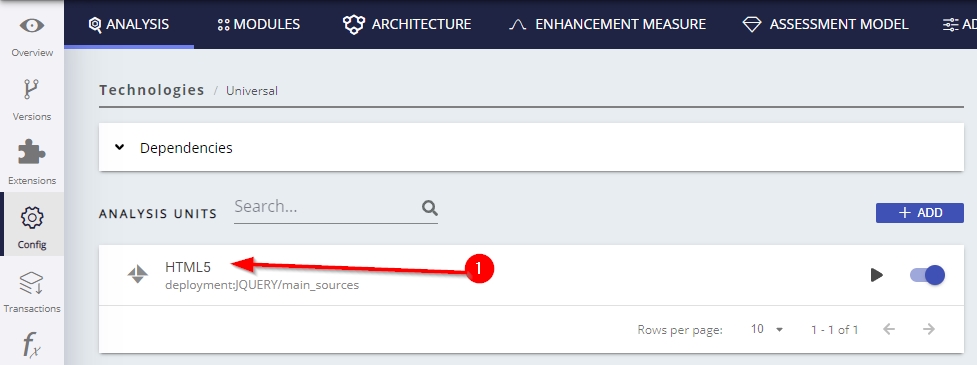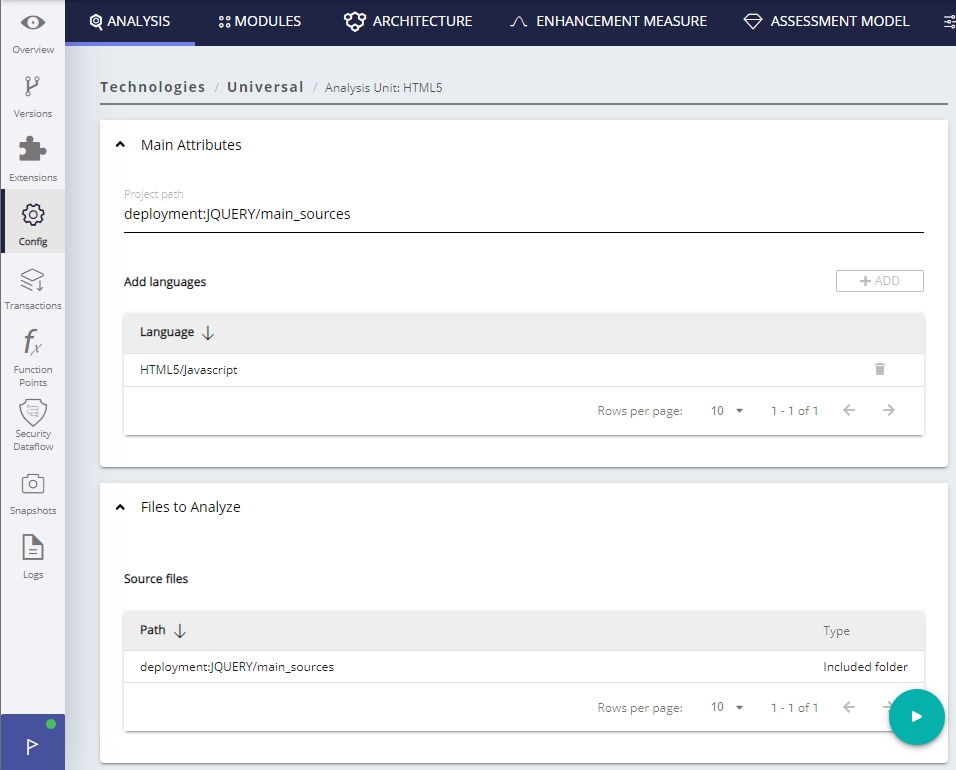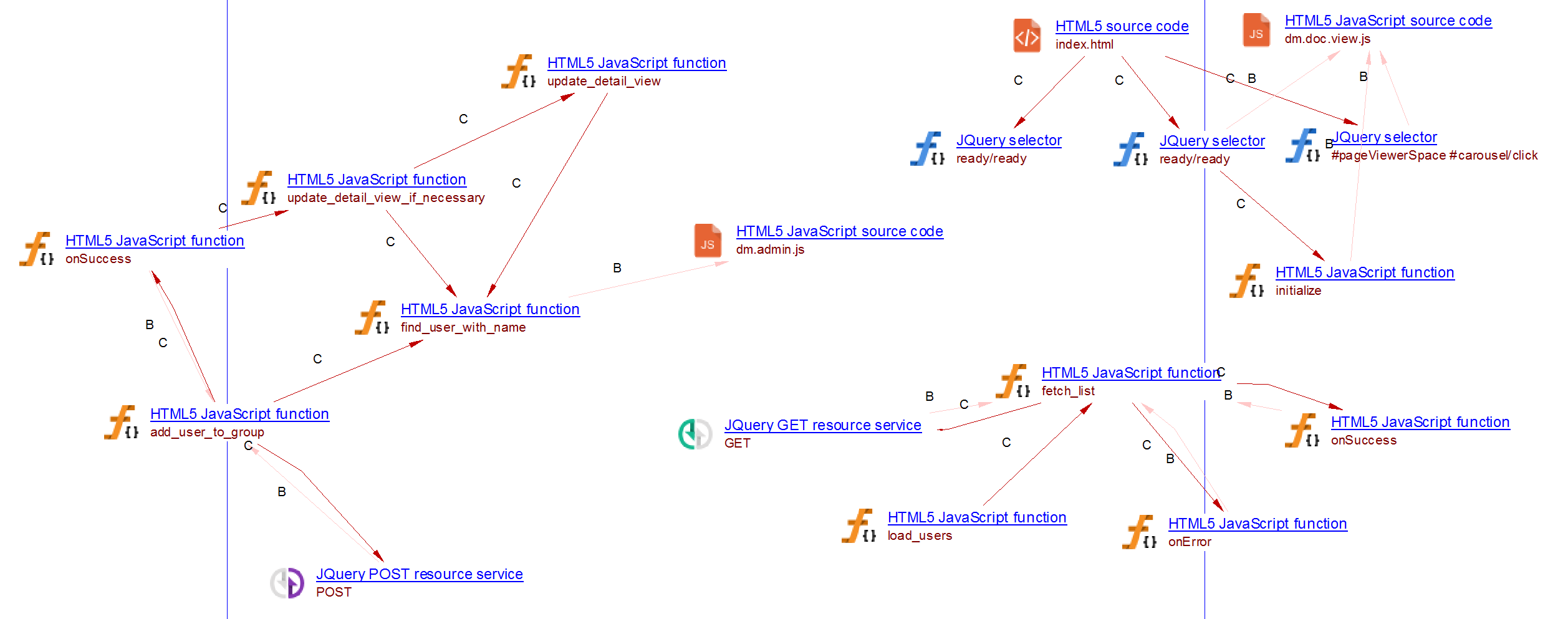jQuery - 2.3
Extension ID
com.castsoftware.jquery
What’s new?
See jQuery - 2.3 - Release Notes for more information.
Description
This extension provides support for jQuery.
In what situation should you install this extension?
If your Web application contains jQuery source code and you want to view these object types and their links with other objects, then you should install this extension:
- Creates jQuery events and access points to services:
- jQuery events: they represent a query in DOM tree
- jQuery access points to web services: CAST_JQuery_GetResourceService, CAST_JQuery_PutResourceService, CAST_JQuery_PostResourceService
- Creates links (direct or indirect) from jQuery events to jQuery access points to services (these links are created by the jQuery extension and the HTML5/JavaScript extension).
- Links from the jQuery access points to services to different servers written in other languages are then created by the WBSlinker extension (an internal extension).
- The following declarations will create a jQuery event:
$('#advancedLoginOptionsLink').bind('click', dm.login.toggle_advanced);
$('#advancedLoginOptionsLink').click(dm.login.toggle_advanced);
$('#advancedLoginOptionsLink').on('click', this.destroy.bind(this));....
Transaction configuration
Default entry point is the HTML file content.
Supported jQuery versions
| Versions | Supported? |
|---|---|
| 1.0 - 3.x |
Function Point, Quality and Sizing support
This extension provides the following support:
- Function Points (transactions): a green tick indicates that OMG Function Point counting and Transaction Risk Index are supported
- Quality and Sizing: a green tick indicates that CAST can measure size and that a minimum set of Quality Rules exist
| Function Points (transactions) |
Quality and Sizing | Security |
|---|---|---|
Comparison with existing support for JavaScript
CAST AIP has provided support for analyzing JavaScript via its JEE and .NET analyzers (provided out of box in CAST AIP) for some time now. The HTML5/JavaScript extension (on which the jQuery extension depends) also provides support for JavaScript but with a focus on web applications. CAST highly recommends that you use this extension if your Application contains JavaScript and more specifically if you want to analyze a web application, however you should take note of the following:
- You should ensure that you configure the extension to NOT analyze the back end web client part of a .NET or JEE application.
- You should ensure that you configure the extension to ONLY analyze the front end web application built with the HTML5/JavaScript that communicates with the back end web client part of a .NET or JEE application.
- If the back end web client part of a .NET or JEE application is analyzed with the jQuery extension and with the native .NET/JEE analyzers, then your results will reflect this - there will be duplicate objects and links (i.e. from the analyzer and from the extension) therefore impacting results and creating erroneous Function Point data.
Note that in CAST AIP ≥ 8.3.x support for analyzing JavaScript has been withdrawn from the JEE and .NET analyzers.
CAST Imaging Core compatibility
AIP Core release
|
Supported
|
|---|---|
| 8.3.x |
Dependencies with other extensions
Some CAST extensions require the presence of other CAST extensions in order to function correctly. The jQuery extension requires that the following other CAST extensions are also installed:
Note that when using the CAST Extension Downloader to download the extension and the Manage Extensions interface in CAST Server Manager to install the extension, any dependent extensions are automatically downloaded and installed for you. You do not need to do anything.
Download and installation instructions
The extension will be automatically downloaded and installed in AIP Console.
Analysis using CAST Imaging Console
CAST Imaging Console exposes the technology configuration options once a version has been accepted/imported, or an analysis has been run. Click Universal Technology (3) in the Config (1) > Analysis (2) tab to display the available options for your jQuery source code:

Then choose the relevant Analysis Unit (1) to view the configuration:


What results can you expect?
Once the analysis/snapshot generation has completed, you can view the results in the normal manner (for example via CAST Enlighten):

Web Service calls
The following libraries are supported for Web Service HTTP calls:
- $.ajax
- $.get
- $.post
- jQuery.sap.syncGet
- jQuery.sap.syncGetJSON
- jQuery.sap.syncGetText
- jQuery.sap.syncPost
- Ajax.Request
- Ext.Ajax.request
- CQ.Ext.Ajax.request
Once the JQuery extension analysis is finished, the analyzer will give the output, i.e., the final number of web service calls created.
These web services are resolved to web service operations on the server side for the following supported frameworks: Node.js, JAX-RS, Spring MVC:
$.ajax
$.ajax({
type: 'POST',
url: val ? '_auth/login' : '_auth/logout',
data: {assertion: assertion},
success: function(res, status, xhr) { window.location.reload(); },
error: function(xhr, status, err) {
box.remove();
navigator.id.logout();
alert('Login failure: ' + err);
}
});
$.get
$.get("ajax/test.html", function( data )
{
$( ".result" ).html( data );
alert( "Load was performed." );
}
);
$.post
$.post( "ajax/test.html", function( data ) { $( ".result" ).html( data ); });
jQuery.sap.syncGet
jQuery.sap.syncGet("syncGet_url", { dataType: "json" });
jQuery.sap.syncGetJSON
jQuery.sap.syncGetJSON("syncGetJSON_url", { dataType: "json" });
jQuery.sap.syncGetText
jQuery.sap.syncGetText("syncGetText_url", { dataType: "json" });
jQuery.sap.syncPost
jQuery.sap.syncPost("syncPost_url", { dataType: "json" });
Ajax.request
new Ajax.Request('/your/url', {
onSuccess: function(response) {
// Handle the response content...
}
});
Ext.Ajax.request
Ext.Ajax.request({
url: '/api/students',
method: 'GET',
timeout: 60000,
params:
{
id: 1 // loads student whose Id is 1
},
headers:
{
'Content-Type': 'application/json'
},
success: function (response) {
},
failure: function (response) {
Ext.Msg.alert('Status', 'Request Failed.');
}
});
CQ.Ext.Ajax.request
CQ.Ext.Ajax.request({
url: 'foo.php',
success: someFn,
failure: otherFn,
headers: {
'my-header': 'foo'
},
params: { foo: 'bar' }
});
Objects
The following specific objects are displayed in CAST Enlighten:
| Icon | Description |
|---|---|

|
jQuery Selector |

|
jQuery $.ajax, $.get, $.getJSON, $.getScript jQuery SAP sjax, syncGet, syncGetJSON, syncGetText Get Resource Service |

|
jQuery $.ajax, $.get, $.getJSON, $.getScript jQuery SAP syncPost Post Resource Service |

|
jQuery $.ajax, $.get, $.getJSON, $.getScript Put Resource Service |

|
jQuery $.ajax, $.get, $.getJSON, $.getScript Delete Resource Service |
Structural Rules
The following structural rules are provided: